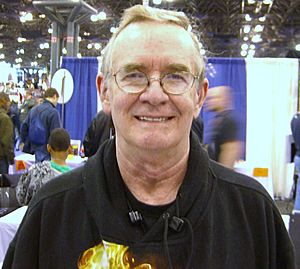Gary Friedrich facts for kids
Quick facts for kids Gary Friedrich |
|
|---|---|

Gary Friedrich at the April 2008
New York Comic Con |
|
| Born | August 21, 1943 Jackson, Missouri, U.S. |
| Died | August 29, 2018 (aged 75) St. Louis, Missouri, U.S. |
| Area(s) | Writer |
|
Notable works
|
Sgt. Fury and his Howling Commandos, The Monster of Frankenstein, Ghost Rider |
| Awards | Shared Alley Award for Sgt. Fury as Best War Title, 1967 and 1968 Inkpot Award 2007 Bill Finger Award 2010 |
Gary Friedrich (August 21, 1943 – August 29, 2018) was an American writer for comic books. He was famous for his stories during the Silver Age of comics. He worked mostly for Marvel Comics.
Friedrich helped create popular characters like the supernatural motorcyclist Ghost Rider. He also co-created the hero Son of Satan. He wrote many stories for Marvel's Sgt. Fury and his Howling Commandos. This series was about a World War II military team.
He also wrote for The Monster of Frankenstein. Later in his life, there was a disagreement about who owned the rights to the Ghost Rider character. This was eventually settled.
Contents
Early Life and Start in Comics
Gary Friedrich was born on August 21, 1943, in Jackson, Missouri. He grew up there and finished high school in 1961. In high school, he was the editor of the school newspaper. He was also friends with Roy Thomas, who later became a big name at Marvel Comics.
After high school, Gary worked at a record store. Then he got a job at local newspapers. He worked very long hours, doing almost everything himself. This was a tough time for him.
In 1965, his friend Roy Thomas, who was now working for Marvel in New York City, called him. Roy suggested that Gary could try writing comics too. The very next day, Gary took a bus to New York. He stayed with Roy and another friend in Manhattan.
They soon got an apartment together in Greenwich Village. This area was a very creative place at the time. Gary remembered it as a "neat place to be." He started to enjoy the music and the free-spirited atmosphere there.
Comics Career Highlights
Gary Friedrich began his comics career writing for Charlton Comics. This company was known for giving new writers a chance. He wrote romance comics and even some superhero stories there. One of his first superhero features was "The Sentinels."
Working at Marvel Comics
Soon, Gary started writing for Marvel Comics. He began by writing Western comics like Kid Colt, Outlaw and Two-Gun Kid. He also worked on the Western series Ghost Rider.
His big break came when he started writing Sgt. Fury and his Howling Commandos. This series was about a brave group of soldiers in World War II. Gary wrote stories that showed the friendships between soldiers. He also explored the serious side of war. One famous story, "The War Lover," looked at the difference between fighting and murder. This was a bold topic for its time.
Gary also created new characters for Marvel. He was the co-creator and first writer of the motorcycle-riding demon Ghost Rider. He also helped create the supernatural hero Son of Satan.
He worked on many other Marvel titles too. These included The Incredible Hulk, Captain America, and Daredevil. He was known as a "utility writer" because he could write for many different types of comics.
Other Comics Work
Besides Marvel, Gary also wrote for other comic publishers. He wrote horror comics for Skywald Publications. For this company, he created a character called Hell-Rider. This character was a motorcycle-riding hero with a special flame-thrower bike.
He also wrote for Atlas/Seaboard Comics. There, he worked on crime comics and other adventure stories.
Later Career and Character Rights
In 1978, Gary Friedrich left the comics world. He moved back to Missouri and worked as a driver. In the 1990s, he did some more comic writing for Topps Comics.
Later, there was a disagreement about who owned the rights to the Ghost Rider character. Gary Friedrich believed he should have some ownership. He filed a lawsuit against Marvel and other companies. After some time, the parties involved reached an agreement. This settlement resolved the issue of character ownership.
Personal Life
Gary Friedrich lived in Jefferson County, Missouri. He was married to Jean and had a daughter named Leslie. He passed away on August 29, 2018, in St. Louis, Missouri. He had been dealing with Parkinson's disease and hearing loss.
Awards
- Sgt. Fury and his Howling Commandos won the Alley Award for Best War Title in 1967 and 1968.
- Inkpot Award 2007
- Bill Finger Award 2010
Books
- Brown, Len, and Gary Friedrich, Encyclopedia of Rock & Roll (1970)
- Brown, Len, and Gary Friedrich, Encyclopedia of Country and Western Music (1971)
- Brown, Len, and Gary Friedrich, So You Think You Know About Rock and Roll (1972)
- Nashville Breakdown (1977)
 | Delilah Pierce |
 | Gordon Parks |
 | Augusta Savage |
 | Charles Ethan Porter |

